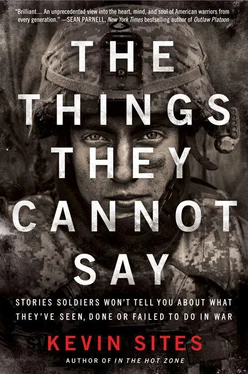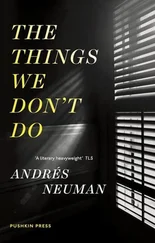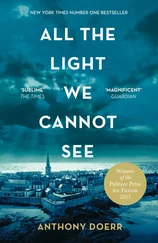But the credit he offers me is undeserved. Though I did pick up an end of his stretcher, along with five Marines, during Operation Phantom Fury in Fallujah, Iraq, it was hardly an act that saved his life. Military medics and later surgeons were responsible for that. I was simply an extra hand to help move him from an open flatbed truck to an armored troop carrier for evacuation. While I had been embedded with his unit, I had never seen Sperry until the first day of the ground offensive. He was lying on his back in an alleyway. He looked dazed as his head was bandaged by a Navy corpsman. I remember zooming in, as I videotaped him, on the crimson beads of a rosary hanging out of one of the trouser pockets of his BDUs. I wondered if he still believed in their power now that he was wounded; maybe he believed in them even more. I wouldn’t learn until years later that it wasn’t even his rosary.
It was strange that Sperry’s note had a consoling effect on me, considering that up until that point my actions had remained in my mind over the years not as an act of kindness on my part, but as a sin of omission. For while I helped carry Sperry to safety, and I’m glad I did, a few hours earlier I had also walked away from an older Iraqi man slowly bleeding to death after being shot in the head by a Marine sniper (detailed in the prologue). Sperry’s note has not absolved me of what I did not do, but in a small way it affirmed what I did, and for now, that has made some difference to me.
During my Nieman Fellowship at Harvard, Sperry and I begin a series of conversations over Skype. But he’s struggling too. Like me, he’s using alcohol to self-medicate, but also pot and the dozen prescription medications that are part of his daily postwar routine. He sometimes disappears for weeks at a time without picking up for our calls. I plead with him by e-mail but still silence. Eventually he reemerges, but I know it will take meeting face-to-face if I’m ever going to get his complete story. When he finally resurfaces, I convince him to allow me to visit him over Christmas break on a one-day stopover on my way to see my parents in Arizona. He agrees but then disappears again. Just when I’m about to give up on him, he surfaces and confirms my visit, just five days before I’m scheduled to arrive.
It’s already dark at five thirty P.M. when I pull up to James Sperry’s house on a small, unlighted cul-de-sac in a small southern Illinois town about forty-five minutes east of downtown Saint Louis. It’s two days before Christmas and my flights have been predictably delayed by weather and overbooking this time of year. I was supposed to arrive nearly five hours ago. I double-check the address because there are no cars in the driveway and no lights on in the house. Several of the other houses on the cul-de-sac are wired for the holidays, plastic Santas and candy canes putting off the only illumination on the street. Sperry’s house is bare. I knock on the door and already begin to feel a little strange and intrusive. Though our paths crossed six years ago on the embattled streets of Fallujah, we were strangers then, as well as now.
Sperry and I have been building trust, over the last two months, trying to peel back the years and details of what happened since we last met. It has been a humbling and trying process beset by the challenges of both his responsibilities, which include a wife and three-year-old daughter, as well as the physical and psychological wounds that require a chef’s salad worth of drugs every day, including clonazepam for anger (Sperry calls it his chill pill), citalopram for adrenaline deficiency (overtaxed during his deployment), hydrocodone for headaches, mirtazapine and Ambien to sleep, prazosin to head off his nightmares and a self-injecting EpiPen-type device like those carried by people allergic to bee stings, which Sperry administers in the case of debilitating migraines that send him quivering into a dark closet with a blanket over his head until he can fall asleep. Sperry, admittedly, also heavily self-medicated with alcohol back at Camp Pendleton for nearly two years after his return from Iraq, drinking with other Iraqi vets from early morning until he passed out at night, filling the days with death-seeking stunts like gunning his Japanese sport motorcycle (a nearly stereotypical impulse buy for many returning vets) down the freeway at over a hundred miles an hour—drunk.
He said he’d probably be dead already if it hadn’t been for the Vietnam-era veterans he met after being committed to a VA psych ward for a month following a failed suicide attempt. They helped convince him that while alcohol could temporarily numb his feelings, its long-term depressant effect would eventually kill him. Sperry said he had since mostly replaced alcohol with marijuana (the exception, supposedly, is a few beers now and then). While it was actually VA doctors who recommended he start using marijuana medicinally, Sperry said, it was unlawful for them to dispense it. Instead he now buys it from a former high school buddy. “It’s the only thing that has really helped me,” he said.
Sperry said while the pot leveled him out, it was his daughter Hannah that really gave him any reason to live. He explained the challenges he faced daily in an e-mail before my visit.
November 2009 (e-mail from Sperry to me)
I have lost twenty friends and would love to have any photos available. Transition has been extremely difficult. I have nightmares almost nightly and migraine headaches every other day. I don’t have any friends beside my close family because I feel like I can’t relate to anyone. I did try to kill my self three years ago before the birth of my daughter. I spent a month in a mental institution. I have almost no short-term memory. I can’t do school at all I have failed out of every class almost. I use to be smart but since my several traumatic brain injures I can’t do much besides housework and raising my daughter. The only way I sleep is by pills. I take pills for everything my extreme anger, depression, anxiety, and panic attacks. I was way to young to experience the death of all my friends. I don’t want to get close to any one because I don’t want to have anymore hurt in my life. I can’t be away from my family for any long period of time with out having extreme panic attacks and anxiety because I am not there standing guard over the people I have left to love. I am not normal I am in a different reality then the majority of easy going Americans. I wake up every morning hurting in my hips, back, shoulders, and head. I wonder how it is going to be when I am thirty years old. I am only twenty-four and have lived a life I wish on no one. The bright and shining star in my life and the reason I get up and go thru the routines is to watch the innocent of my daughter. I look forward to hearing from you. Sincerely,
James Sperry
Within a few seconds of my knocking, Sperry arrives at the door wearing a T-shirt and jeans and socks but no shoes. He’s accompanied by two dogs, Carly, a newly acquired, rambunctious bull terrier that his daughter, Hannah, named after the popular Nickelodeon program iCarly , and a spaniel–Saint Bernard mix named Everett, who, like Sperry, is shuffling along and showing a bit more age than he has.
We shake hands. I tell Sperry he looks better than the last time I saw him, through the viewfinder of my camera. He laughs, but Everett backs away. I reach out a hand, palm down, for him to sniff, but he’s wary, moving down the hallway away from me. When I stand upright, he lets out several deep woofs.
“Wow,” Sperry says, surprised, “that’s really strange. I’ve never seen him bark at anyone… ever.”
I’m just as surprised. I’ve had dogs for a good portion of my life and understand the techniques for lowering their sense of threat level. But perhaps Everett has absorbed some of Sperry’s postwar hypervigilance, a common symptom, according to psychologists and psychiatrists, of combat veterans suffering from post-traumatic stress disorder. It is, experts believe, a continuation of the vigilance soldiers had to adopt to survive for prolonged periods in war zones, as well as an effect of their loss of the ability to trust others. Many dog owners learn to trust the instinct of their animals. I hope Sperry doesn’t read too much into it. Despite the pleasantries, I can already see the palpable discomfort my arrival has created for him. A phone call is different than a visit; there’s separation and the ability to control the conversation by ending it whenever one chooses. However, now I’m here in his living room at my own request, to see and talk to him face-to-face about his life after war. And it’s a story, despite his delays, I think he wants to tell.
Читать дальше












